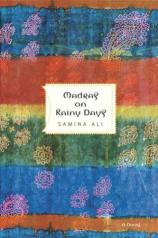Madras on Rainy Days
Review
Madras on Rainy Days
MADRAS ON RAINY DAYS opens with the celebration of a wedding
between Layla, a nineteen-year-old college student, and Sameer, an
ambitious engineer. The five-day ceremony is lush with the rich
traditions of the families' Muslim culture in the Indian walled
city of Hyderabad, and by all accounts the arranged marriage is a
good match for both families.
Behind the scenes of the opulent festivities, though, something is
terribly wrong. Layla, who has spent most of her life in the United
States, is deeply conflicted about her parents' desire to have her
participate in the traditional arranged marriage. She feels at home
neither in India, where she is viewed with suspicion as an
outsider, nor in America, where her parents deliberately segregated
her from modern culture. "I was supposed to inhabit America without
being inhabited by it," she says.
Despite her parents' attempt to shelter her, though, Layla still
underwent many American rites of passage, often without her
parents' knowledge: "getting drunk for the first time, sucking at
my first joint... losing my virginity." This last transgression is
deadly serious; if her previous sexual experience becomes public,
not only will Layla's husband reject her, but her father will be at
liberty to abuse and even kill her.
Layla successfully conceals her previous relationship (and the
resulting pregnancy and miscarriage) long enough for her to be
embraced by Sameer's family. Indeed, much to Layla's surprise, she
finds herself attracted to this husband she did not choose and does
not yet love. When Sameer disappears for days on end and fails to
reciprocate Layla's sexual attraction, though, Layla begins to
wonder if her new husband may be hiding some secrets of his
own.
This sensual novel is set at the start of India's monsoon season,
when the combination of torrential rains and stifling heat combine
to create an almost suffocating atmosphere. The novel, with its
detailed descriptions of confining interiors and its emphasis on
women's lives in the home, effectively communicates this
claustrophobic feeling. Less successful is the last-minute attempt
to dramatize Muslim-Hindu tensions; the political violence that
breaks out at the end of the novel seems out of place with the
relentless intimacy of the rest of the narrative.
Ali's novel suffers from some of the problems endemic to first
novels. It sometimes bends under the weight of its own
self-importance, and its symbolism is a little too carefully
explicated. At one point, for example, Layla remarks, "It was not
possible anymore for him to make even a broad statement about
cultural invasion without thinking specifically about my body." Why
not let readers make those conclusions themselves? Astute readers,
in addition to being able to decipher symbolism on their own, will
also be less than surprised by Sameer's revelations near the
novel's end. MADRAS ON RAINY DAYS is not a great novel, but it does
offer readers an illuminating portrayal of one young woman's
cultural crisis.
Reviewed by Norah Piehl on January 22, 2011
Madras on Rainy Days
- Publication Date: January 15, 2004
- Genres: Fiction
- Hardcover: 320 pages
- Publisher: Farrar, Straus and Giroux
- ISBN-10: 0374195625
- ISBN-13: 9780374195625




